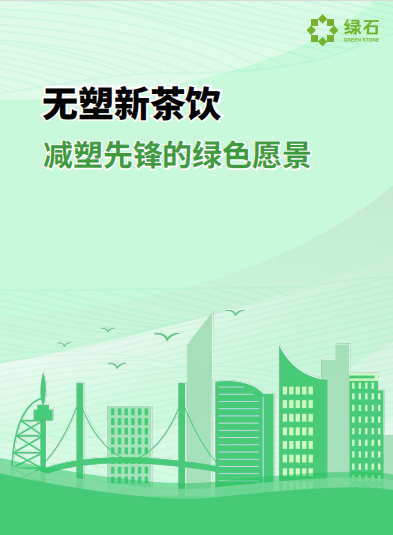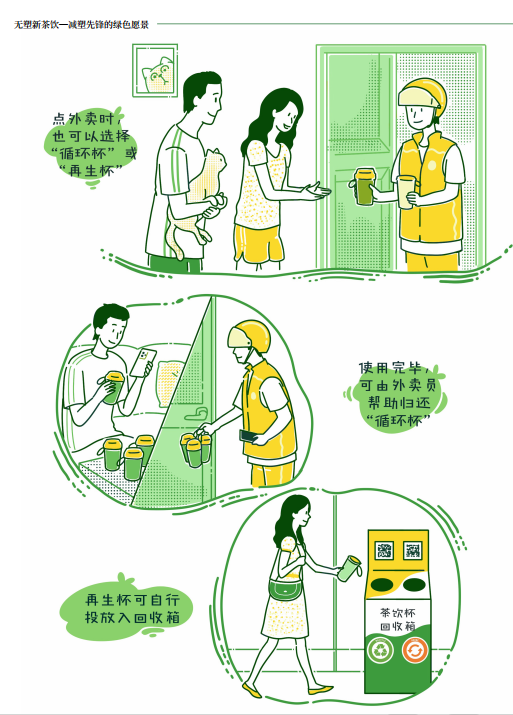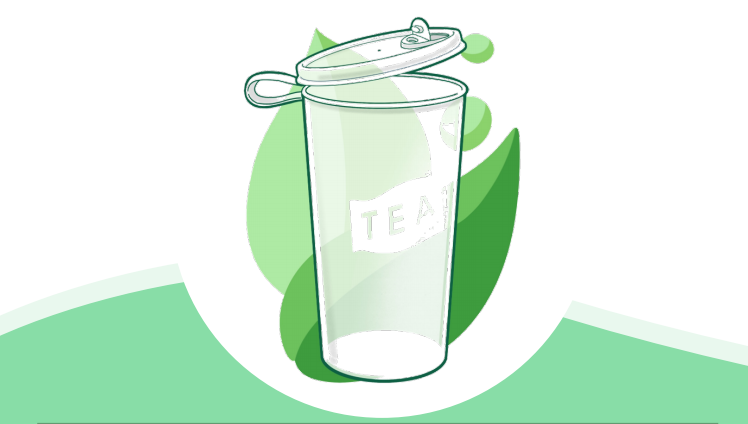New trends in plastic reduction in the new tea and beverage industry: Is "plastic-free milk tea shop" feasible?
In order to solve the plastic pollution problem caused by the new tea industry, Nanjing Green Stone Environmental Protection Center (hereinafter referred to as Green Stone) and the Pacific Environmental Resources Center (USA) Chongqing Representative Office jointly held a new tea beverage plastic reduction and brand sustainability online seminar on September 4. The report "Plastic-Free New Tea Drinks: The Green Vision of a Pioneer in Plastic Reduction"(hereinafter referred to as the report) was released at the meeting, which discussed the feasibility of the new tea beverage industry becoming a pioneer in plastic reduction, and innovated by integrating cutting-edge solutions from all over the world. Sexually propose a new idea of "plastic-free milk tea shop" in the current plastic reduction environment.

Reducing plastic has become the general trend of the new tea industry
In recent years, the scale of the new tea beverage industry has expanded rapidly. According to the "2023 New Tea Drink Research Report" released by the China Chain Store and Franchise Association, the market size of the new tea drink brand will reach 150 billion yuan in 2023 and is expected to reach 200 billion yuan in 2025. According to incomplete statistics, as of the end of August 2023, the total number of new tea and beverage stores in operation is approximately 515,000, an increase of nearly 40% from 378,000 at the end of 2020.
But at the same time, the new tea industry is also a veritable "big user of plastics." The environmental protection organization Green Xiaoxiang once investigated the amount of plastic used by common new tea brands on the market and found that the amount of plastic packaging used in a single cup of milk tea can range from ten to tens of grams, with a maximum of about 50 grams.
The report "Unlocking the New" Green "Meaning of Milk Tea-Research on Plastic Reduction Paths in China's New Tea Drinking Industry" released by the Pacific Environmental Resources Center also shows that the amount of plastic waste generated by the new tea drinking industry in 2023 will be approximately 430,400 tons. This is roughly equivalent to the plastic domestic waste produced in a very large city with a permanent population of 21 million in about 4 months (taking Beijing as an example); or the plastic domestic waste produced in a large city with a population of 9 million in one year (taking Hefei as an example).If no measures are taken, by 2030, the plastic waste generated by the new tea and beverage industry will reach 1.241 million tons, 2.8 times that of 2023.
Therefore, for the development of new tea brands, environmental protection has gradually become a must-have option. At present, many new tea brands have shifted their competition to foreign countries. For example, the European Union's "Corporate Sustainability Reporting Directive"(CSRD) puts forward mandatory requirements for companies to disclose non-financial information such as environmental governance. If new tea and beverage companies want to go to sea, they must develop new low-carbon and environmentally friendly business models and assume corresponding social and environmental responsibilities. Implementing the plastic reduction strategy will help companies enhance their brand image and market competitiveness.
The report pointed out that the plastic reduction model can also save costs for new tea and beverage companies. For example, by using a single material and simplifying packaging standards, companies 'packaging procurement costs will be reduced; the reduction of disposable packaging products will also directly reduce transportation costs and carbon emissions accompanying the transportation process.
Adopting plastic reduction models such as recycled cups or self-contained cups can also reduce the use of disposable packaging and inventory management costs. Although the initial cost of the recycling cup may be high, as the number of uses increases, the cost will gradually decrease, and ultimately the cost reduction will be realized.
In addition, the plastic reduction model can also help companies avoid potential environmental risks and related costs, such as fines for non-compliance with environmental regulations or brand reputation loss caused by plastic pollution issues.
Explore a new model of "plastic-free milk tea shop" to reduce the use of disposable plastics
In order to promote plastic reduction in the industry, based on the characteristics of the new tea and beverage industry itself, the report envisions a new model of "plastic-free milk tea shops" that says no to disposable plastics.
The "plastic-free milk tea shop" model starts from the new tea consumer end to reduce plastic, with self-contained cups, recycled cups and renewable milk tea cups as the main highlights. Even customers will experience a series of environmental protection measures throughout the entire process from entering the store to leaving the store. Innovation and avoid the use of disposable plastics as much as possible.
Since 2022, Green Stone has launched the Bring Your Own Cup Action Month for three consecutive years, guiding nearly a thousand people to use bring their own cups when consuming online in new tea and beverage stores. Among the participants, many people have gone from finding it troublesome to bring their own cups to becoming a habit. Others have reported that bringing your own cup of milk tea will make the purchase process more participatory and "feel more comfortable using your own cup"... These real feelings also reflect positive signals that consumers accept bringing their own cups.
The "Wusu Milk Tea Shop" also welcomes customers to bring their own cups to buy milk tea and enjoy some purchase discounts or online points. For some mature drinks, customers can also choose their taste preferences on the self-service milk tea machine and purchase them themselves. These plans also have traces to follow in reality.
For example, as early as 2020, Naixue's Tea took the lead in launching a self-contained cup discount activity and continues to this day. Many new tea drink brands such as Xi Tea, Mixue Ice City, Bawang Chaji, and Yihetang have also developed or introduced smart devices developed by third parties to facilitate customers to purchase drinks by themselves.

If consumers forget to bring their cups out, they can also choose to borrow recycled cups provided by stores. This measure can not only reduce the generation of plastic waste, but also improve the user experience through a convenient return system. After customers finish drinking the milk tea, they can return the recycling cup to the designated recycling point, and professional companies will be responsible for in-depth cleaning and disinfection to achieve recycling.
The recycling cup plan also has reference in reality. For example: as early as 2021, Taiwan Family Convenience Store began to provide a "revolving cup" smart rental service, so customers can easily complete the loan repayment process through their mobile application. Such a recycling cup can be reused about 1000 times and can be recycled after reaching its service life. For family brands, the "recycling cup" model also reduces store operating costs.

In addition, the new model of "plastic-free milk tea shop" also provides consumers with the option of renewable milk tea cups. These milk tea cups meet the production design requirements of easy-to-recycle plastic products, and customers can use them after paying a certain deposit. After drinking, customers can put the milk tea cups into a recycling point upgraded from existing garbage sorting facilities, and the deposit will be refunded immediately. The recycled milk tea cups will enter a professional recycling process and be made into new renewable milk tea cups or other environmentally friendly products, realizing closed-loop utilization of resources.
Companies have tried similar packaging recycling actions. For example, Nestlé 's "Coffee Capsule Recycling Plan" opens up channels for recycling waste capsules to the consumer side. However, the promotion of renewable milk tea cups still faces technology, cost and challenges in terms of consumer acceptance, and the practical level needs to be further explored.
It is worth mentioning that the "plastic-free milk tea shop" proposed in the report not only can be used in offline store consumption scenarios. When customers order online takeout, they can also choose to use recycling cups or renewable milk tea cups to purchase milk tea.
The report also puts forward some reference suggestions on how to integrate plastic-free new tea drinks into public life and create a social atmosphere of green consumption. For example, the use record of recycling cups can be included in the green energy of Ant Forest, and the public can participate in a number of new tea drinks brands. Charity activities organized by the community.
"Becoming a pioneer in plastic reduction is a win-win situation for the new tea and beverage industry that achieves both economic benefits and environmental responsibilities." Wei Luyun, manager of the Green Stone Plastic Reduction Project, said that he hopes that the tea and beverage industry will actively practice plastic reduction practices and contribute to building a A greener and sustainable future.







